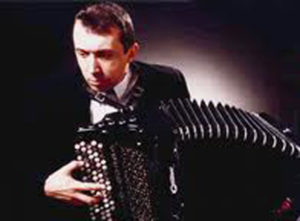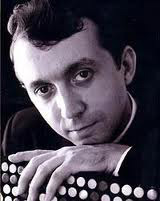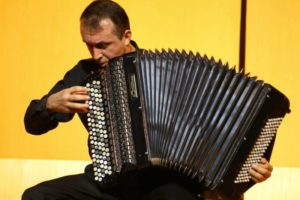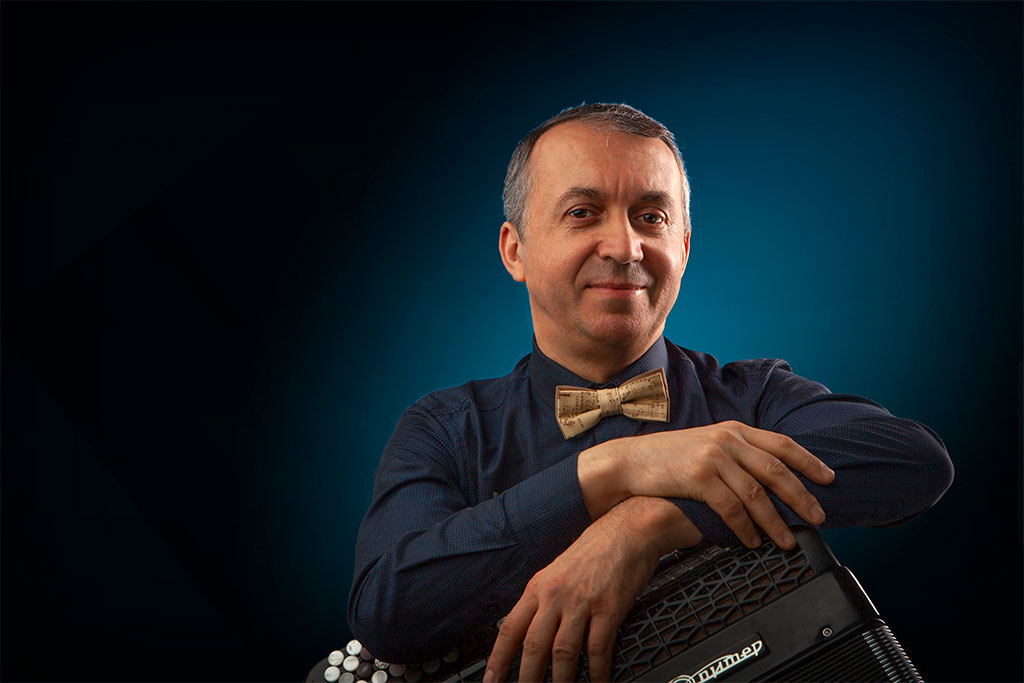La mia fisarmonica? È una parte del mio corpo
Gli inderogabili principi di Yuri Shishkin
 Conosciuto in tutto il mondo, Yuri Shishkin (1963) è un genio nel campo della fisarmonica. Ha iniziato a studiare in ambito familiare e, dopo aver lasciato la scuola di musica ad Azov, il suo paese natale, in Russia, Yuri è entrato alla Rostov School of Arts. Nel 1992, si è diplomato alla Gnesins Russian Academy of Music di Mosca e ha iniziato la sua carriera professionale. Si è esibito riscontrando grande successo in Olanda, Belgio, Germania, Finlandia, Svezia, USA, Canada, Cina e America Latina. Oltre alle sue apparizioni internazionali, Yuri si esibisce spesso nella sua terra nativa, presentando al pubblico nuove composizioni e arrangiamenti interessanti di compositori come Bach, Frank, Brahms, Khandoshkin, Prokofiev, Stravinsky, Moszkowski, Sibelius, Schnittke, Gorchakov, Semionov, Podgorny, Kusiakov, Copland, Rachmaninoff, Orff, Gershwin e altri. Le famose trascrizioni per pianoforte di Vladimir Horowitz eseguite da Shishkin sulla sua fisarmonica a bottoni sono una rivelazione per il pubblico. Yuri è un musicista pieno di entusiasmo e passione per la musica, che ama elaborare nuove tecniche del suono estendendo le possibilità dello strumento con un fascino artistico del tutto speciale.
Conosciuto in tutto il mondo, Yuri Shishkin (1963) è un genio nel campo della fisarmonica. Ha iniziato a studiare in ambito familiare e, dopo aver lasciato la scuola di musica ad Azov, il suo paese natale, in Russia, Yuri è entrato alla Rostov School of Arts. Nel 1992, si è diplomato alla Gnesins Russian Academy of Music di Mosca e ha iniziato la sua carriera professionale. Si è esibito riscontrando grande successo in Olanda, Belgio, Germania, Finlandia, Svezia, USA, Canada, Cina e America Latina. Oltre alle sue apparizioni internazionali, Yuri si esibisce spesso nella sua terra nativa, presentando al pubblico nuove composizioni e arrangiamenti interessanti di compositori come Bach, Frank, Brahms, Khandoshkin, Prokofiev, Stravinsky, Moszkowski, Sibelius, Schnittke, Gorchakov, Semionov, Podgorny, Kusiakov, Copland, Rachmaninoff, Orff, Gershwin e altri. Le famose trascrizioni per pianoforte di Vladimir Horowitz eseguite da Shishkin sulla sua fisarmonica a bottoni sono una rivelazione per il pubblico. Yuri è un musicista pieno di entusiasmo e passione per la musica, che ama elaborare nuove tecniche del suono estendendo le possibilità dello strumento con un fascino artistico del tutto speciale.
Considerando che non sei molto attivo sui social e sappiamo poco di te, ti va di raccontare ai lettori di “Strumenti & Musica” i tuoi progetti, le attività che ti tengono impegnato in questo periodo?
Grazie per avermi invitato a fare un’intervista. Per rispondere alla prima domanda, vorrei dire che sono molto cauto quando si tratta di parlare dei miei progetti. Faccio sempre quello che amo nella musica. Anche se inserisco nel mio repertorio qualcosa di nuovo, che non ha ancora trovato posto nel mio cuore, cerco sempre di amare ciò che suono – questa è la mia regola fondamentale. Altrimenti non ci sarà una vera chimica tra me e la musica, e quindi non ci sarà successo. È meglio non analizzare queste cose sottili, né tantomeno raccontarle agli altri. Mi limiterò a dire che attualmente sto lavorando a un programma che comprenderà nuovi brani di Semyonov, diverse trascrizioni di musica orchestrale e pianistica e una suite sconosciuta di Alexander Kusiakov. Perché sconosciuta? Perché ho ricevuto queste note solo dopo la sua morte. Me le ha date la sua vedova e mi ha detto che Kusyakov considerava questa suite, composta da dodici movimenti, poco interessante. Quando ho letto lo spartito, mi sono reso conto di avere tra le mani un capolavoro! Spero che presto diventi famosa in tutto il mondo.
So che stai lavorando alla registrazione di un nuovo CD. Puoi dirci qualcosa di più?
C’è uno studio assolutamente meraviglioso in Russia, nella città di Kirov. Ha attrezzature molto professionali e un ingegnere del suono. E, soprattutto, la registrazione non è digitale, ma analogica, come nei dischi. Il direttore dello studio mi ha contattato e mi ha proposto di collaborare. Ho accettato e ho deciso di registrare Rossini, Vlasov e Hopkins questa estate. Non so se sarà un nuovo CD, ma sicuramente sarà registrato in studio.
Tra i vari album che hai inciso, ce n’è uno a cui sei particolarmente legato?
No, ci sono singoli brani di ogni CD che mi sono cari ma, nel complesso, la mia esecuzione non è perfetta.
Che tipo di fisarmonica ti aiuta a esprimere al meglio le tue qualità? Utilizzi strumenti diversi per registrare e per le esibizioni in concerto?
La mia fisarmonica è una parte del mio corpo. Ammiro i musicisti che riescono a cambiare strumento con facilità. Per me questo processo è molto doloroso. Ho avuto sei fisarmoniche e ogni volta che ne ho presa una nuova, ho passato mesi alla ricerca del mio suono. Con la mia attuale fisarmonica, lo sto ricercando da un anno e mezzo. Per me è molto importante trovare il mio suono, affinché ci sia la mia anima dentro. Ma non è solo questo, non riesco a suonare alcuni pezzi del mio vecchio repertorio sul mio nuovo strumento. Così come succede per i Notturni di Chopin, l’originale al pianoforte suona bene, ma la trascrizione perde gran parte della sua bellezza. Ecco perché ho solo una fisarmonica ed è una Jupiter russa. Ho sempre suonato solo la Jupiter, questo strumento permette di dar voce alla mia anima.
 Facciamo un salto indietro nel tempo. Dopo aver lasciato la scuola di musica ad Azov, ti sei formato presso la Rostov School of Arts e poi ti sei diplomato alla Gnesins Russian Academy of Music di Mosca. Quali sono stati i docenti che hanno segnato il tuo percorso e in che modo hanno influito sulla tua formazione artistica?
Facciamo un salto indietro nel tempo. Dopo aver lasciato la scuola di musica ad Azov, ti sei formato presso la Rostov School of Arts e poi ti sei diplomato alla Gnesins Russian Academy of Music di Mosca. Quali sono stati i docenti che hanno segnato il tuo percorso e in che modo hanno influito sulla tua formazione artistica?
Dopo essermi diplomato alla Rostov School of Arts, ho studiato al Music Institute di Rostov-sul-Don (oggi Conservatorio) e poi sono andato a Mosca per studiare come assistente. In entrambe le città il mio insegnante è stato Vyacheslav Semyonov, che durante l’ultimo anno è partito per vivere e lavorare a Mosca. La prima grande influenza sul percorso musicale fu il mio insegnante al college. Si chiamava Nikolai Grigorenko. Alla scuola di musica non avevo alcuna motivazione, facevo solo del mio meglio per rendere felici i miei genitori. La musica non mi dava gioia. Dopo tutto, ci si aspettava che fossi disciplinato, e questo non mi piaceva. A quei tempi la parola “disciplina” suonava come “punizione” per me. Ero un bambino molto dispettoso e non riuscivo a stare fermo, ma il mio maestro Grigorenko mi ha trasmesso l’amore per lo strumento. Esigeva un’alta qualità delle esecuzioni e molto presto ho iniziato a divertirmi suonando con nitidezza e chiarezza di articolazione, con giusti cambi di colore, pulizia e stabilità. Più tardi, nella classe di Semyonov, ho capito che l’eccellenza è la gioia suprema per un musicista. Se sai come lavorare, il piacere ti accompagna per tutta la vita. Immaginate che tutta la vostra vita sia un piacere: cosa c’è di meglio?! Ancora oggi Vyacheslav Semyonov continua a rivelarmi i segreti della sua bravura. Vado alle sue lezioni, suono e ricevo consigli importanti. Il mio maestro continua ancora oggi ad aiutarmi a migliorare. Quindi, riassumendo in poche parole: Grigorenko mi ha insegnato la disciplina, mentre Semyonov mi ha mostrato le illimitate possibilità della fisarmonica.
Rispetto agli anni della tua formazione, pensi che la didattica attuale sia cambiata in Russia? Se sì, in che modo?
Non credo che l’insegnamento in Russia sia cambiato molto negli ultimi anni. Sono stati scritti diversi nuovi metodi per fisarmonica, ma non c’è nulla di rivoluzionario. Da un lato, le basi dell’insegnamento rimangono le stesse, ma dall’altro il repertorio è cambiato e i bambini suonano meglio. Oggi alcuni studenti a scuola suonano già i pezzi che noi suonavamo al conservatorio, il livello è aumentato. Direi che alla fine tutto dipende dalle capacità di insegnamento e dal talento dell’insegnante. È impossibile insegnare a suonare a un allievo senza talento, anche con l’aiuto dei metodi più avanzati. Solo il lavoro e l’estro giocano un ruolo decisivo. Non sono quindi i libri di testo e i metodi a fare la differenza, ma gli insegnanti di talento che devono pretendere qualità.
A causa della pandemia, sono ormai anni che ci siamo dovuti adattare alle lezioni online. Come hai organizzato le lezioni?
Ho studenti adulti e non ho vissuto l’incubo dei docenti che insegnano ai bambini. Ci siamo esercitati online, ma solo dopo aver ascoltato i miei studenti esibirsi tramite registrazione. Prima inviavano la registrazione, nella quale si sentono meglio i dettagli, dopodiché proseguivamo con la lezione online. Siamo tutti contenti che fortunatamente questo periodo in Russia sia finito.
Cosa ne pensi della didattica a distanza? Sei riuscito a trarne dei lati positivi?
Quando abbiamo iniziato le lezioni online durante la pandemia, mi è sembrato che ci fossero degli aspetti positivi. Ad esempio, per la registrazione di un video per un concorso, lo studente riproduce l’intero programma molte volte senza fermarsi. Questo aumenta la sua resistenza. Un’altra caratteristica positiva è che si può insegnare agli studenti dove e quando si vuole. È più comodo e dà maggiore libertà. Solo ora, mi rendo conto che i corsi online forse sono poco utili. Oggi sono disposto a studiare in un bar con trenta persone sedute a mangiare, purché sia offline, perché il prodotto principale del nostro lavoro – il suono – rimane vivo.
In qualsiasi nazione tu vada a tenere un concerto, il pubblico ti acclama; dove e quando saranno i prossimi eventi che ti vedranno protagonista?
In tutta la mia vita, non è mai capitato di esibirmi in concerto e di non essere applaudito o di sapere che non fosse piaciuto. Amo il mio pubblico e posso suonare un concerto completo anche se ad ascoltarmi dovessero esserci solo due persone. Ai miei studenti dico: imparate prima a dare e poi a ricevere. Forse è per questo che ho fatto trentatré concerti dal gennaio 2022 ad oggi. A marzo sono stato a casa solo sei giorni e ad aprile quattro; nel resto del tempo ho viaggiato, tenuto concerti e masterclass. Ora, i miei studenti si stanno preparando per gli esami, quindi passo più tempo a casa e a dare lezioni. Comunque, ogni giorno, mi alzo alle 5 o alle 5.30 per andare al liceo musicale, che è diventato la mia seconda casa. Ci sono andato per la prima volta a quattordici anni e ora ci vivo affianco. Fin dalle prime ore del mattino, suono sul palco (non in classe) per mantenere l’abitudine di suonare in una sala grande. Mi esercito fino alle 9.30, poi arriva l’orchestra e io vado a prendere un caffè. Questa è la mia regola: il caffè va guadagnato, bisogna prima lavorare sodo per guadagnarselo. È un mio principio personale, anche se a volte lo infrango! Comunque, tra la fine di maggio e giugno ho alcuni concerti, a luglio e ad agosto ci saranno le scuole estive e spero di visitare l’Italia alla fine dell’estate.
 È bello sapere che forse verrai in Italia. Ti vedremo impegnato sul palco o a insegnare nelle masterclass?
È bello sapere che forse verrai in Italia. Ti vedremo impegnato sul palco o a insegnare nelle masterclass?
Se verrò in Italia, sicuramente suonerò per tutti quelli che mi circondano. Le masterclass da sole non danno un’informazione completa, bisogna suonare. E spero di portare qualcosa che non è ancora stato ascoltato in Russia, almeno un paio di pezzi.
Cosa pensi del livello dei fisarmonicisti italiani che partecipano alle tue masterclass?
Ho capito molto tempo fa che i fisarmonicisti italiani sono musicisti più acuti dei nostri studenti in Russia. In Italia non cercano di raggiungere una grande dinamica e forti picchi sonori. La cosa principale in Italia è un bel suono e, forte o silenzioso che sia, è una questione di concezione.
Considerando che sei sempre in viaggio e hai la possibilità di vivere molte realtà europee, quali sono, secondo il tuo punto di vista, le scuole che hanno caratterizzato la didattica fisarmonicistica in Europa nei decenni passati e quali invece sono di riferimento oggi?
Tutto si evolve ciclicamente: prima erano alcuni Paesi ad essere nostri concorrenti nelle competizioni, oggi lo sono altri. Per esempio, quando gareggiavo con i francesi e i polacchi, i serbi e i cinesi non avevano visibilità tra i partecipanti. Oggi sono quasi i nostri principali rivali. Spero che nonostante cambino i concorrenti, il livello dei musicisti russi non diminuisca. Guardando le scuole di fisarmonica di tutto il mondo, alcune sono puro sport, altre sono vera musica, altre ancora sono troppo intellettuali o troppo antiquate, e altre hanno tutto ma non la strategia di preparare gli studenti alle competizioni. La cosa principale sarà sempre la personalità del musicista. Non vado in sala per ascoltare una scuola, mi interessano il pensiero e l’energia dell’esecutore, la varietà e la multistratificazione delle sue linee sonore, la sua comprensione della musica. La scuola può solo dare le basi, l’ulteriore sviluppo spetta ad ognuno di noi.
Foto: Vladimir Vergoti
————————————————————————————
My accordion? It is a part of my body
The unwavering principles of Yuri Shishkin
 Known all over the world, Yuri Shishkin (1963) is a genius in the field of accordion playing. He started studying at home and, after leaving music school in his native Azov, Russia, Yuri entered the Rostov School of Arts. In 1992, he graduated from the Gnesins Russian Academy of Music in Moscow and began his professional career. He has performed with great success in the Netherlands, Belgium, Germany, Finland, Sweden, the USA, Canada, China and Latin America. In addition to his international appearances, Yuri often performs in his native land, presenting audiences with new compositions and interesting arrangements of composers such as Bach, Frank, Brahms, Khandoshkin, Prokofiev, Stravinsky, Moszkowski, Sibelius, Schnittke, Gorchakov, Semionov, Podgorny, Kusiakov, Copland, Rachmaninoff, Orff, Gershwin and others. The famous piano transcriptions of Vladimir Horowitz performed by Shishkin on his button accordion are a revelation for the audience. Yuri is a musician full of enthusiasm and passion for music. He loves to develop new sound techniques, extending the possibilities of the instrument with a very special artistic flair. With great honour, I leave you to read the interview which I had pleasure to carry out with him.
Known all over the world, Yuri Shishkin (1963) is a genius in the field of accordion playing. He started studying at home and, after leaving music school in his native Azov, Russia, Yuri entered the Rostov School of Arts. In 1992, he graduated from the Gnesins Russian Academy of Music in Moscow and began his professional career. He has performed with great success in the Netherlands, Belgium, Germany, Finland, Sweden, the USA, Canada, China and Latin America. In addition to his international appearances, Yuri often performs in his native land, presenting audiences with new compositions and interesting arrangements of composers such as Bach, Frank, Brahms, Khandoshkin, Prokofiev, Stravinsky, Moszkowski, Sibelius, Schnittke, Gorchakov, Semionov, Podgorny, Kusiakov, Copland, Rachmaninoff, Orff, Gershwin and others. The famous piano transcriptions of Vladimir Horowitz performed by Shishkin on his button accordion are a revelation for the audience. Yuri is a musician full of enthusiasm and passion for music. He loves to develop new sound techniques, extending the possibilities of the instrument with a very special artistic flair. With great honour, I leave you to read the interview which I had pleasure to carry out with him.
Considering that you are not very active on social media and we know very little about you, would you like to tell the readers of “Strumenti & Musica” about your projects, the activities that keep you busy these days?
Thank you for inviting me for an interview. In answer to the first question, I would like to say that I am very careful when it comes to talking about my plans. I always do what I love in music. Even if I take something new into my repertoire, which has not yet found a place in my heart, I always try to love what I play – that’s my basic rule. Otherwise there will be no real chemistry between me and the music, and therefore no success. It’s better not to analyse such subtle things, let alone tell others about them. I will just say that I am currently working on a programme that will include new pieces by Semyonov, several transcriptions of orchestral and piano music as well as an unknown suite by Alexander Kusiakov. Why unknown? Because I received these notes only after his death. His widow gave them to me and said that Kusyakov considered this suite to be uninteresting. There are twelve movements there. When I read the sheet music, I realised I was holding a masterpiece in my hands! I hope it will soon become world-renowned.
I know you are working on recording a new CD. Can you tell us more about it?
There is an absolutely wonderful studio in Russia, in the town of Kirov. It has very professional equipment and a sound engineer. And, most importantly, the recording is not digital, but analog, like on records. The studio’s director found me and offered me to cooperate. I agreed and decided to record this summer Rossini, Vlasov and Hopkins. I don’t know if it will be a new CD, but it will be recorded in the studio for sure.
Among the various albums you have recorded, is there one you are particularly attached to?
No. There are individual pieces from each CD that are dear to me. But overall, my performance is not perfect.
What kind of accordion helps you express your qualities to the fullest? Do you use different instruments for recording and concert performances?
My accordion is a part of my body. I admire musicians who can change instruments easily. For me, this process is very painful. I’ve had six accordions and every time I got a new one, I spent months searching for my sound. With my current accordion, I’ve been searching for a sound for a year and a half. It’s very important for me to find my sound, to have my soul in it. But it’s not just that either. I can’t play some pieces from my old repertoire on my new instrument. It’s like a transcription of Chopin’s Nocturnes. In the original on the piano it sounds well, but in the transcription it loses most of its beauty. That’s why I only have one accordion. And it’s a Russian Jupiter. I’ve always played only the Jupiter. This instrument can tell me everything my soul wants.
 Let’s take a step back into your past. After finishing the music school in Azov, you studied at the Rostov School of Arts and then graduated from the Gnesins Russian Academy of Music in Moscow. Who were the teachers who marked your path and how did they influence your artistic career?
Let’s take a step back into your past. After finishing the music school in Azov, you studied at the Rostov School of Arts and then graduated from the Gnesins Russian Academy of Music in Moscow. Who were the teachers who marked your path and how did they influence your artistic career?
After graduating from the Rostov College of Arts, I studied at the Music Institute in Rostov-on-Don (now the Conservatoire), and then I went to Moscow to study as an assistant. My teacher was Vyacheslav Semyonov in both cities, as in my final year he left to live and work in Moscow. The first big influence on my musical path was my teacher at the college. His name was Nikolai Grigorenko. At the music school I didn’t have any purpose, I only did my best to make my parents happy. Music did not bring me joy. After all, I was expected to be disciplined, and I did not like that. In those days the word “discipline” sounded like “punishment” to me. I was a very mischievous child and could not still. But my teacher Grigorenko taught me to love playing. He demanded high quality of playing, and very soon I began to enjoy playing with crispness and clarity of articulation, correct fur changes, cleanliness and steadiness. Later in Semyonov’s class I came to realise that excellence is the ultimate joy for a musician. If you know how to work, the pleasure accompanies you all your life. Imagine, your whole life is a pleasure. What could be better! Even today Vyacheslav Semyonov continues to reveal the secrets of his skill to me. I come to his lessons, play and receive important advice. My teacher still helps me in my development. So, in a nutshell: Grigorenko taught me discipline while Semyonov showed me the unlimited possibilities of the accordion.
Compared to your formative years, do you think current teaching has changed in Russia? If so, in what way?
I don’t think teaching in Russia has changed much in recent years. Several new accordion methods have been written, but there is nothing revolutionary about them. On the one hand, the basics of teaching remain the same but on the other hand the repertoire has changed and the children are playing better. Today, some children at school are already playing the pieces which we used to play at the conservatory. The level of playing has increased. But in the end it all comes down to the teaching skills and talent of a teacher. It is impossible to teach a talentless pupil to play even with the help of the most progressive methods. Only work and flair play a decisive role here. So it is not textbooks and methods, but talented teachers that will always be in demand.
For a few years, due to the pandemic, we have had to adapt to online lessons. How have you organised your lessons?
I have adult students and I didn’t experience the nightmare that the teachers who teach children did. We practised online, but only after I had listened to my students perform on tape. First the recording, then the lesson. You can hear the details better in the recording. After that, you can go online. We are all glad that this period in Russia is over.
What do you think about distance learning? Have you been able to draw any positive aspects from it?
When we started online classes in pandemic, it seemed to me that there were positive aspects. For example, for a video recording for a competition, a student plays the whole programme many times without stopping. That builds up his/her stamina. Another convenience is that you teach students wherever and whenever you want. It’s more comfortable and gives you more freedom. But now I realise that there is little good in online classes. Nowadays I am prepared to study in a cafe with thirty people sitting there and eating, as long as it is offline, because the main product of our work – the sound stays alive.
No matter where you go to give a concert, the audience cheers you on; where and when will you have the next events?
I have never had a concert in my life where I was not applauded or where I was told it was bad. I love my audience and can play a full concert even if only two people are listening. And I tell my students: learn to give first and take later. Maybe that’s why I have had thirty-three concerts since January 2022 up to now. In March I was only six days at home, and in April four. The rest of the time I travelled, gave concerts and master classes. Now my students are preparing for their exams, so I spend more time at home and teach them. But I also get up every day at 5 or 5:30 in the morning and go to the music college, which has become my second home. I first went there when I was fourteen and now I live next door to it. From the early morning I play on stage (not in class) to keep the big hall reflex. I practice until 9:30, then the orchestra comes and I go for a coffee. That’s my rule – coffee has to be earned. You have to work hard first to get your coffee. It’s a personal principle. Sometimes I break it, though!
Anyway, I have a few gigs at the end of May and in June, summer schools in July and August and I hope to visit Italy at the end of August.
 It is nice to know that maybe you will come to Italy. Will we see you busy on stage or teaching in masterclasses?
It is nice to know that maybe you will come to Italy. Will we see you busy on stage or teaching in masterclasses?
If I come to Italy, I will definitely play for everyone around me. Master classes alone don’t give the full information, you have to play. And I hope to bring something that has not yet been heard in Russia. At least a couple of pieces.
What do you think about the level of the Italian accordion players that take part in your masterclasses?
I realised a long time ago that Italian accordionists are more subtle musicians than our students in Russia. In Italy, they don’t try to achieve big climaxes and a high level of dynamics. The main thing in Italy is a beautiful sound, and whether it is loud or quiet is a question of conception.
Considering that you are always travelling and have the opportunity to experience many European realities, what are, in your opinion, the schools that have characterised accordion teaching in Europe in past decades and which ones today?
Everything evolves in cycles. In the competitions, our competitors have changed. For example, when I was contesting with the French and Poles, the Serbs and Chinese were not even visible among the participants. Today, they are almost our main rivals. I hope while the competitors will be changing, the level of Russian musicians will not decrease. Looking at the accordion schools in the whole world, some of them are pure sport, some are real music, some are too intellectual or too outdated, and some have everything, but not the strategy of preparing students for competitions. The main thing will always be the personality of the musician. I don’t go to the hall to listen to a school, I’m interested in the thought and energy of the performer, the variety and multi-layeredness of his sound lines, his understanding of music. The school can only give you the basics, further development is on you.
Photo: Vladimir Vergoti

